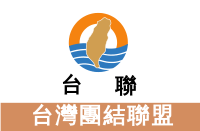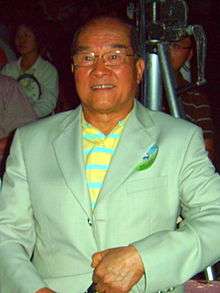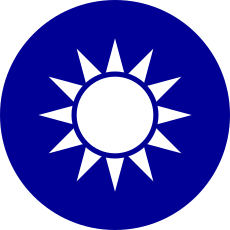Taiwan Solidarity Union
Taiwan Solidarity Union 台灣團結聯盟 Táiwān Tuánjié Liánméng | |
|---|---|
 | |
| Leader | Liu I-te |
| Leader emeritus | Lee Teng-hui (nonmember) |
| Founded | August 12, 2001 |
| Headquarters | Taipei City, Taiwan |
| Think tank | Lee Teng-hui Foundation (unofficial) |
| Membership | 500+[1] |
| Ideology |
Taiwan independence Social liberalism Taiwanization Taiwanese nationalism[2] |
| Political position | Centre-left |
| Domestic affiliation | Pan-Green Coalition |
| Legislative Yuan |
0 / 113 |
| Local Councillors |
8 / 907 |
| Party flag | |
 | |
| Website | |
| www.tsu.org.tw | |
| Taiwan Soildarity Union | |||||||||||
| Traditional Chinese | 臺灣團結聯盟 | ||||||||||
|---|---|---|---|---|---|---|---|---|---|---|---|
| Simplified Chinese | 台湾团结联盟 | ||||||||||
| |||||||||||
| Commonly abbreviated in Chinese as | |||||||||||
| Traditional Chinese | 臺聯 | ||||||||||
| Simplified Chinese | 台联 | ||||||||||
| |||||||||||
The Taiwan Solidarity Union (TSU; Chinese: 台灣團結聯盟; pinyin: Táiwān Tuánjié Liánméng; Pe̍h-ōe-jī: Tâi-oân Thoân-kiat Liân-bêng) is a political party in Taiwan which advocates Taiwan independence, Taiwanese localization movement and social liberalism. It was officially founded on August 12, 2001 and is considered part of the Pan-Green Coalition. Unlike the Democratic Progressive Party, its larger companion party in the Pan-Green Coalition, the TSU actively campaigns for the creation of a de jure Republic of Taiwan. The future of the party is in doubt after the 2016 elections as the party failed to secure enough votes to be eligible for state funding.[3]
History
In the summer of 2001, supporters of former ROC president Lee Teng-hui formed the Taiwan Solidarity Union. In the 2000 presidential elections, the Kuomintang (KMT) suffered a devastating defeat, in which internal turmoil had caused the party to lose its grip on power. This was blamed on Lee, the KMT Chairman at the time, and he was forced to resign in March 2001. The hardliners in the KMT and recently expelled supporters of James Soong believed Lee secretly harbored support for Taiwan independence and had purposely sabotaged the KMT (by not allowing Soong to run under the KMT) in order to allow Chen Shui-bian, the Democratic Progressive Party (DPP) candidate, to win. Meanwhile, after winning the presidential election, Chen Shui-bian moderated his pro-independence position, alienating some hardline independence supporters in the DPP. By July, just months before the December 2001 elections to the Legislative Yuan, these factors accumulated to result in the formation of the TSU to continue Lee's policies, and fill the void in Taiwanese politics caused by the DPP's abandonment of its strongly pro-independence political stance. It was hoped that this would lead to a pan-green majority in the nation's primary legislative body, thus giving the executive branch, under Chen, the political backing necessary to pursue policies supportive of Taiwanese independence.
The party name and emblem were announced on 25 July 2001, and was officially founded on 12 August.[4]
The TSU's stated political aim is the advocacy of the creation of a Republic of Taiwan and a policy of desinicization which consists of eliminating the symbols and concepts which connect Taiwan to the idea of China. The TSU argues that any lingering connection with the concept of China renders Taiwan an "abnormal nation" and that clearly separating Taiwan from China is necessary to prevent Taiwan from being dominated by an enemy and foreign nation. The TSU has also strongly advocated the creation of a new constitution for Taiwan and abandonment of the Republic of China as Taiwan's formal name.
Lee was, naturally, identified as the "spiritual leader" (though he personally never joined the party); the TSU hoped that Lee's popularity would help the TSU make the 5% support mark. Further, Lee's dominance in the party was revealed when the candidates TSU nominated had all been personally approved by Lee beforehand. Meanwhile, as Lee's actions increasingly departed from the KMT's unificationist positions, he was eventually expelled from the Kuomintang. Although there was some initial speculation that Lee's expulsion would cause mass defections in the Kuomintang, none of the major Kuomintang leaders or Lee's close associates changed sides. Nonetheless, former members of the KMT were still to be the fundamental building blocks of the new party, with half of TSU candidates coming directly from the KMT.
After winning nine seats in the 225-member Legislative Yuan in December 2001, the TSU has largely displaced the Taiwan Independence Party (TAIP) as the strongly pro-Taiwan-independence political force and the TSU legislators began advocating relevant resolutions. For instance, they have opened the debates about changing the national flag and national anthem. In the 2002 Republic of China municipal elections in Taipei and Kaohsiung, TSU fielded no mayoral candidate, and it suffered a defeat in winning no seats in the Taipei City council and won only two seats in the Kaohsiung City council.
Yasukuni Shrine visit
The visit to the Yasukuni Shrine by TSU chairman Shu Chin-chiang in April 2005 generated a controversy across the political spectrum and further made their party goals more ambiguous to the voters. However, the TSU has made it clear that it would achieve its goal of total independence by all means. Chairman Shu denied the visit should be seen as support for militarism, and claimed it was a goodwill gesture to Taiwan's former colonial master Japan to further strengthen the security of the Pacific region. Chairman Su also emphasized that there is a need to remind the Taiwanese public that the People's Republic of China is aiming 700 missiles towards Taiwan and that Japan would be an important ally if China were inclined to invade.
Chairman Shu's visit, however, gave opportunity to aboriginal legislator Kao Chin Su-mei to gain publicity by protesting with her supporters at the chairman's arrival at the Chiang Kai-Shek International Airport, now renamed Taiwan Taoyuan International Airport. Later on the TSU press conference was disrupted by an angry mob from the members of pro-unification Patriot Association (愛國同心會), who showed their disagreement and dissatisfaction by throwing eggs at the conference building. The DPP, the ruling party, kept a low profile in this controversy and attempts to distance itself from the incident.
Current status
The TSU suffered defeat in the December 2005 local elections, along with its pan-green partner the DPP, and failed to win any municipal mayoral or county magistrate seats. Its representation in the Legislative Yuan was eliminated by the 2008 election when it failed to win any district-contested seats and failed to gain the 5% threshold for proportional representation.
In the 2012 legislative elections, the TSU won 8.98% of the popular vote and earned three representatives to the Legislative Yuan, renewing its status as a credible third party in Taiwanese government. The 2016 legislative elections saw the TSU win 2.51% of all votes, not enough for representation. The latest loss lead to the resignation of party chairman Huang Kun-huei.[5] Shortly after, all of the party's workforce was laid off.[3]
Election results
Legislative elections
| Election | Total seats won | Total votes | Share of votes | Outcome of election | Election leader |
|---|---|---|---|---|---|
| 2001 | 13 / 225 |
801,560 | 8.5% | |
Huang Chu-wen |
| 2004 | 12 / 225 |
756,712 | 8.28% | |
Huang Chu-wen |
| 2008 | 0 / 113 |
344,887 | 3.5% | |
Huang Kun-huei |
| 2012 | 3 / 113 |
1,178,896 | 8.96% | |
Huang Kun-huei |
| 2016 | 0 / 113 |
305,675 | 2.51% | |
Huang Kun-huei |
Local elections
| Election | Mayors & Magistrates |
Councils | Third-level Municipal heads |
Third-level Municipal councils |
Fourth-level Village heads |
Election Leader |
|---|---|---|---|---|---|---|
| 2002 municipalities only |
0 / 2 |
2 / 96 |
N/A | N/A | N/A | Huang Chu-wen |
| 2005 | 0 / 23 |
11 / 901 |
0 / 319 |
N/A | N/A | Shu Chin-chiang |
| 2006 municipalities only |
0 / 2 |
3 / 96 |
N/A | N/A | N/A | Huang Kun-huei |
| 2009 | 0 / 17 |
3 / 587 |
0 / 211 |
N/A | N/A | Huang Kun-huei |
| 2010 municipalities only |
0 / 5 |
2 / 314 |
N/A | N/A | 0 / 3,757 |
Huang Kun-huei |
| 2014 unified |
0 / 22 |
9 / 906 |
0 / 204 |
0 / 2,137 |
1 / 7,836 |
Huang Kun-huei |
National Assembly elections
| Election | Total seats won | Total votes | Share of votes | Outcome of election | Election leader |
|---|---|---|---|---|---|
| 2005 | 21 / 300 |
273,147 | 7.05% | |
Shu Chin-chiang |
Chairmen

- Huang Chu-wen (12 August 2001 – 25 December 2004)
- Huang Chung-yuan (25 December 2004 – 10 January 2005) (acting)
- Shu Chin-chiang (10 January 2005 – 25 December 2006)
- Lin Chih-chia (25 December 2006 – 26 January 2007) (acting)
- Huang Kun-huei (26 January 2007 – 18 January 2016)
- Lin Chih-chia (18 January 2016 – 16 April 2016) (acting)
- Liu I-te (16 April 2016–present)
See also
References
- ↑ Tu, Aaron (17 April 2016). "TSU elects new party chairman in landslide win". Taipei Times. Retrieved 17 April 2016.
- ↑ http://www.tsu.org.tw/?post_type=policy&p=100
- 1 2 Gerber, Abraham (22 January 2016). "All TSU staff laid off after legislature losses". Taipei Times. Retrieved 22 January 2016.
- ↑ Lin, Chieh-yu; Hsu, Crystal (25 July 2001). "Party with ties to Lee picks name". Taipei Times. Retrieved 16 February 2016.
- ↑ Chang, Hsiao-ti; Chin, Jonathan (20 January 2016). "TSU considering disbanding after election losses". Taipei Times. Retrieved 20 January 2016.
External links
- Official website (Chinese)
